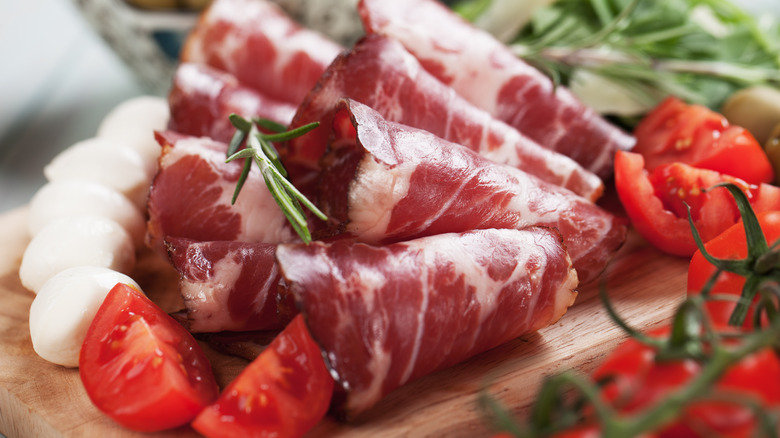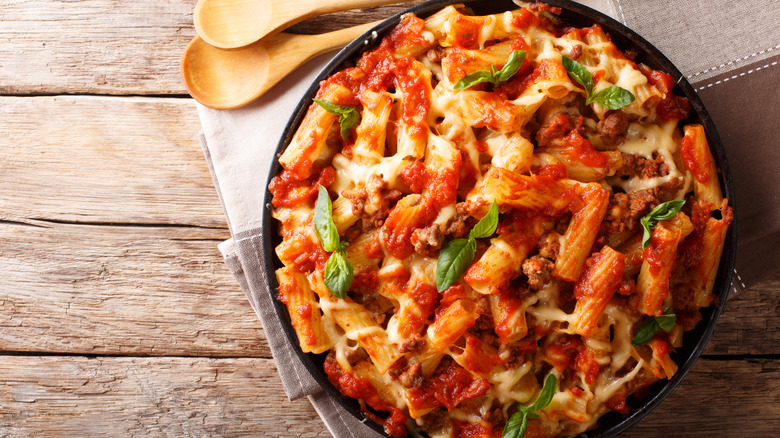The Sopranos-Esque Reason Capicola Is Also Called Gabagool
David Chase's sensational drama series "The Sopranos" stunned audiences from Episode One with its extreme violence, astonishing writing, sublime acting, and the fact that viewers could fall so hard for the ultimate antihero, Tony Soprano, a not-so-nice guy who you couldn't help rooting for. While the show can be described as a study of both 21st century mobs and New Jersey Italian culture, you can't deny it was also an unintentional crash course in the complicated world of Italian linguistics.
Case in point: the heavy use of the word "gabagool" throughout the show's six-season run. Although the word was not created by "The Sopranos," it certainly stoked the curiosity of millions, with many fans adopting, embracing, and using it. "Gabagool" is a distortion of the word "capicola" (which just so happened to be one of Tony's favorite cured meats). "The Sopranos" became such a pop culture phenomenon that its influence — and ensuing use of the word gabagool — even spread to other shows like "Jersey Shore" and "The Office" where Michael Scott hilariously tries to impress an Italian goombah (associate) by ordering it for lunch.
Many agree that "The Sopranos" was so groundbreaking that it changed television forever, but there is no question it also had a big hand in changing the way the American masses — Italians and non-Italians alike — pronounced many words, including many kinds of cured meats.
Unraveling capicola and the Italian language
It's pretty easy to understand Tony's penchant for capicola. Also known as coppa, capicola is a northern Italian, dry-cured meat that comes from the pork shoulder and neck. Unlike prosciutto, which is only seasoned with salt, capicola is often spiced with various seasonings like wine or garlic. It can be served in thin slices on charcuterie boards with cheeses and pickled vegetables; on sandwiches; and (as Tony likes it) right out of the deli package. To understand how it morphed into gabagool requires going back to the old country.
Until 1861, people living in Italy spoke dozens of different languages. Upon the country's unification and throughout World War II, "standard Italian" became the country's official speech and began to be taught in schools nationwide. Still, unique dialects, variations, and accents remained and were passed down from generations, eventually coming with Italian immigrants to America where they settled in large pockets, primarily on the Eastern side of the country.
This is essentially how gabagool was born. Southern Italian dialect often drops the final vowel of a word, changes "c" sounds into "g" sounds, and emphasizes the "o" sound. When you implement these practices into a word like "capicola," you basically get "gabagool." Of course, the DiMeo crime family threw around lots of similar lingo while eating lunch in the back of Satriale's; "mootz-ah-del" (mozzarella), "pruh-zhoot" (prosciutto), and "mani-cott" (manicotti) were all used freely. All of this makes sense in reference to "The Sopranos" considering that Tony's family came from Avellino, just outside of Naples.
The role Italian food played on 'The Sopranos'
Food could have easily been a part of the cast in "The Sopranos" as it was heavily featured throughout the series. Let's face it, food has a huge place in Italian culture and Italian families, so naturally the characters gathered around the table for everything from business sit-downs to Sunday dinners. Carmela Soprano's baked ziti was a favorite of her son, A.J. who famously threw an expletive-filled fit early in the series when he found out it wouldn't be a part of dinner. Her parish priest also had a certain affinity for the pasta dish.
Tony's longtime pal, Artie Bucco, owned and ran Nuovo Vesuvio restaurant, which was featured heavily on the show, serving as the location for many dinners, lunches, and even a food fight between the two friends. Going back to gabagool, Tony's daughter, Meadow, discourages her grandmother from eating it during one early episode due to it being filled with fat and nitrates (she pronounces it just like her father, by the way). And, of course, who could forget the unforgettable final episode which features the Soprano family gathered over a plate of hot onion rings as the show's conclusion, and the characters' fate, hangs in the balance?
"The Sopranos" may be gone but nothing about it will be forgotten, certainly not the way Tony forever changed the way we say certain pork cold cuts.



